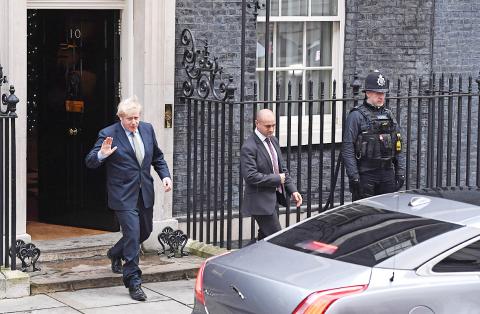British Prime Minister Boris Johnson’s Conservative Party has won a thumping majority of seats in Britain’s Parliament — a decisive outcome to a Brexit-dominated election that should allow Johnson to fulfill his plan to take the UK out of the EU next month.
With 649 of the 650 results declared yesterday, the Conservatives had 364 seats and the main opposition Labour Party 203.
“We did it — we pulled it off, didn’t we?” Johnson told supporters. “We broke the gridlock, we ended the deadlock, we smashed the roadblock!”

Photo: EPA-EFE
The victory makes Johnson the most electorally successful Conservative leader since former British prime minister Margaret Thatcher.
It was a disaster for Labour leader Jeremy Corbyn, who faced calls for his resignation even as the results rolled in.
US President Donald Trump congratulated Johnson on Twitter and said that “Britain and the United States will now be free to strike a massive new trade deal after Brexit.”
Corbyn called the result “very disappointing” for his party and said he would not lead Labour into another election, although he said he would lead a period of “reflection” rather than quit immediately.
Results poured in early yesterday showing a substantial shift in support to the Conservatives from Labour. In the previous election in 2017, the Conservatives won 318 seats and Labour 262.
The result this time delivered the biggest Tory majority since Thatcher’s 1980s heyday, and Labour’s lowest number of seats since 1935.
The Scottish National Party won 48 of Scotland’s 59 seats, up from 35 in 2017, a result that will embolden its demands for a new referendum on Scottish independence.
The Liberal Democrats had only 11 seats. Liberal Democrats leader Jo Swinson stepped down after losing in her own Scottish constituency.
The decisive Conservative showing vindicated Johnson’s decision to press for Thursday’s early election, which was held nearly two years ahead of schedule.
He said that if the Conservatives won a majority, he would get Parliament to ratify his Brexit divorce deal and take the UK out of the EU by the current Jan. 31 deadline.
Senior Johnson aide Dominic Cummings said that the opponents of the Conservatives were not listening to the public outside of London.
“After the shock of the referendum, MPs and journalists should have taken a deep breath and had a lot of self-reflection of why they misunderstood what was going on in the country, but instead a lot of people just doubled down on their own ideas,” Cummings told reporters. “That’s why something like this happens against expectations.”

GAINING STEAM: The scheme initially failed to gather much attention, with only 188 cards issued in its first year, but gained popularity amid the COVID-19 pandemic Applications for the Employment Gold Card have increased in the past few years, with the card having been issued to a total of 13,191 people from 101 countries since its introduction in 2018, the National Development Council (NDC) said yesterday. Those who have received the card have included celebrities, such as former NBA star Dwight Howard and Australian-South Korean cheerleader Dahye Lee, the NDC said. The four-in-one Employment Gold Card combines a work permit, resident visa, Alien Resident Certificate (ARC) and re-entry permit. It was first introduced in February 2018 through the Act Governing Recruitment and Employment of Foreign Professionals (外國專業人才延攬及雇用法),

WARNING: From Jan. 1 last year to the end of last month, 89 Taiwanese have gone missing or been detained in China, the MAC said, urging people to carefully consider travel to China Lax enforcement had made virtually moot regulations banning civil servants from making unauthorized visits to China, the Control Yuan said yesterday. Several agencies allowed personnel to travel to China after they submitted explanations for the trip written using artificial intelligence or provided no reason at all, the Control Yuan said in a statement, following an investigation headed by Control Yuan member Lin Wen-cheng (林文程). The probe identified 318 civil servants who traveled to China without permission in the past 10 years, but the true number could be close to 1,000, the Control Yuan said. The public employees investigated were not engaged in national

The zero emissions ship Porrima P111 was launched yesterday in Kaohsiung, showcasing the nation’s advancement in green technology, city Mayor Chen Chi-mai (陳其邁) said. The nation last year acquired the Swiss-owned vessel, formerly known as Turanor PlanetSolar, in a bid to boost Taiwan’s technology sector, as well as ecotourism in Palau, Chen said at the ship’s launch ceremony at Singda Harbor. Palauan President Surangel Whipps Jr and Minister of Foreign Affairs Lin Chia-lung (林佳龍) also attended the event. The original vessel was the first solar-powered ship to circumnavigate the globe in a voyage from 2010 to 2012. Taiwan-based Porrima Inc (保利馬) installed upgrades with

ENHANCE DETERRENCE: Taiwan has to display ‘fierce resolve’ to defend itself for China to understand that the costs of war outweigh potential gains, Koo said Taiwan’s armed forces must reach a high level of combat readiness by 2027 to effectively deter a potential Chinese invasion, Minister of National Defense Wellington Koo (顧立雄) said in an interview with the Chinese-language Liberty Times (sister newspaper of the Taipei Times) published yesterday. His comments came three days after US Secretary of State Marco Rubio told the US Senate that deterring a Chinese attack on Taiwan requires making a conflict “cost more than what it’s worth.” Rubio made the remarks in response to a question about US policy on Taiwan’s defense from Republican Senator John Cornyn, who said that Chinese